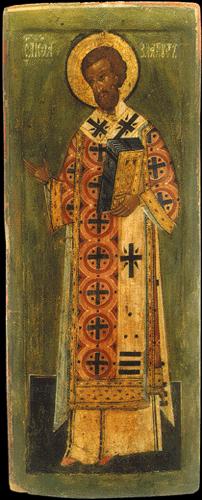
For the priestly office is indeed discharged on earth, but it ranks among heavenly ordinances; and very naturally so: for neither man, nor angel, nor archangel, nor any other created power, but the Paraclete Himself, instituted this vocation, and persuaded men while still abiding in the flesh to represent the ministry of angels. Wherefore the consecrated priest ought to be as pure as if he were standing in the heavens themselves in the midst of those powers. Fearful, indeed, and of most awful import, were the things which were used before the dispensation of grace, as the bells, the pomegranates, the stones on the breastplate and on the ephod, the girdle, the mitre, the long robe, the plate of gold, the holy of holies, the deep silence within. But if any one should examine the things which belong to the dispensation of grace, he will find that, small as they are, yet are they fearful and full of awe, and that what was spoken concerning the law is true in this case also, that “what has been made glorious has no glory in this respect by reason of the glory which excels.” (2 Corinthians 3:10) For when you see the Lord sacrificed, and laid upon the altar, and the priest standing and praying over the victim, and all the worshippers empurpled with that precious blood, can you then think that you are still among men, and standing upon the earth? Are you not, on the contrary, straightway translated to Heaven, and casting out every carnal thought from the soul, do you not with disembodied spirit and pure reason contemplate the things which are in Heaven? Oh! What a marvel! What love of God to man! He who sits on high with the Father is at that hour held in the hands of all, and gives Himself to those who are willing to embrace and grasp Him. And this all do through the eyes of faith! Do these things seem to you fit to be despised, or such as to make it possible for any one to be uplifted against them?
Would you also learn from another miracle the exceeding sanctity of this office? Picture Elijah and the vast multitude standing around him, and the sacrifice laid upon the altar of stones, and all the rest of the people hushed into a deep silence while the prophet alone offers up prayer: then the sudden rush of fire from Heaven upon the sacrifice:— these are marvellous things, charged with terror. Now then pass from this scene to the rites which are celebrated in the present day; they are not only marvellous to behold, but transcendent in terror. There stands the priest, not bringing down fire from Heaven, but the Holy Spirit: and he makes prolonged supplication, not that some flame sent down from on high may consume the offerings, but that grace descending on the sacrifice may thereby enlighten the souls of all, and render them more refulgent than silver purified by fire. Who can despise this most awful mystery, unless he is stark mad and senseless? Or do you not know that no human soul could have endured that fire in the sacrifice, but all would have been utterly consumed, had not the assistance of God’s grace been great.
—St. John Chrysostom, On the Priesthood, 3.4
